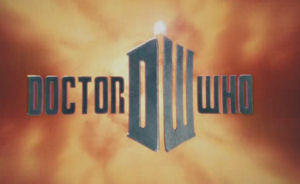They’re either going to love this
one or hate it. I’m pretty sure I loved it.
At first,
taken in parts, it really seems a bit naff. You’ve
got two realities, at least one of which may be a dream,
each appearing to reflect the fantasies of one of “Amy’s
boys.” You’ve got the Dream Lord, a weaselly
little impresario reminiscent of Q, the omnipotent plot
device from Star Trek: The Next Generation who
amuses himself putting the Enterprise crew into period costume
and “unintentionally” helping them demonstrate
the resourcefulness of humanity. And you’ve got the
choice itself, which amounts to Amy choosing Rory or the
Doctor. “Contrived” is too mild a word.
And
yet, as a whole, it’s great fun, starting as always
with the dialogue and delivery (“I’ve crushed
your flowers.” / “Amy will kill you.”),
but even the Doctor Who-in-miniature of the two
realities is pretty terrific. The freezing TARDIS you saw
in the trailer is the lesser of them, perhaps, but features
an impressive spectacle on the scanner and a spooky Silent
Hill: Frozen Memories mood when the console ices over.
The
monsters in Leadworth (excuse me, Upper Leadworth) seem
like standard stuff at first — comfortable familiar
objects/people who open their mouths to reveal what look
like eyes (rather than teeth, as in “The Eleventh
Hour,” “The Beast Below,” “The Time
of Angels,” “Flesh and Stone,” and “Vampires
of Venice” — but they’re deadly eyes,
at least). But as the Dream Lord’s plot becomes clearer,
the symbolism of these old people capable of turning young
people into dust hits home.
 |
Some
fans will most likely find the symbolism obvious or familiar;
the series began asking these kinds of questions about itself
back in the Seventh Doctor’s era, possibly earlier,
and I recall finding them a bit contrived even then. Not
that I didn’t think it made sense for the Doctor to
have a dark side, or that I minded a bit of mystery coming
back, but I wanted it to feel natural and authentic. (The
revelation of the mystery, in Marc Platt’s novel
Lungbarrow, was just godawful nonsense as far as I
was concerned.)
Here
the contrivance of the plot doesn’t matter so much
because the dark side it explores feels perfectly natural
and authentic, as does Amy’s actual choice.
The
strength of a show like this, the freedom that allows it
to feel fresher than ever 47 years after its birth in 1963,
is that it can be anything it needs to be. Fending off menacing
aliens might be its stock in trade, but in the back room
you can always find the underrated gems: space/time riddles
(“Castrovalva”), psychological/philosophical
parables (“Kinda” and “Snakedance”),
sociopolitical satire (“The Sun Makers,” “The
Happiness Patrol,” “The Greatest Show in the
Galaxy,” and more recently “The Long Game”
and “Bad Wolf”), and even commentary on itself
(“Love and Monsters,” a tough pill to swallow
for many reasons).
These
are the episodes that really stand out and stick with me
after they’re over. I’m happy to rank “Amy’s
Choice” among them.







